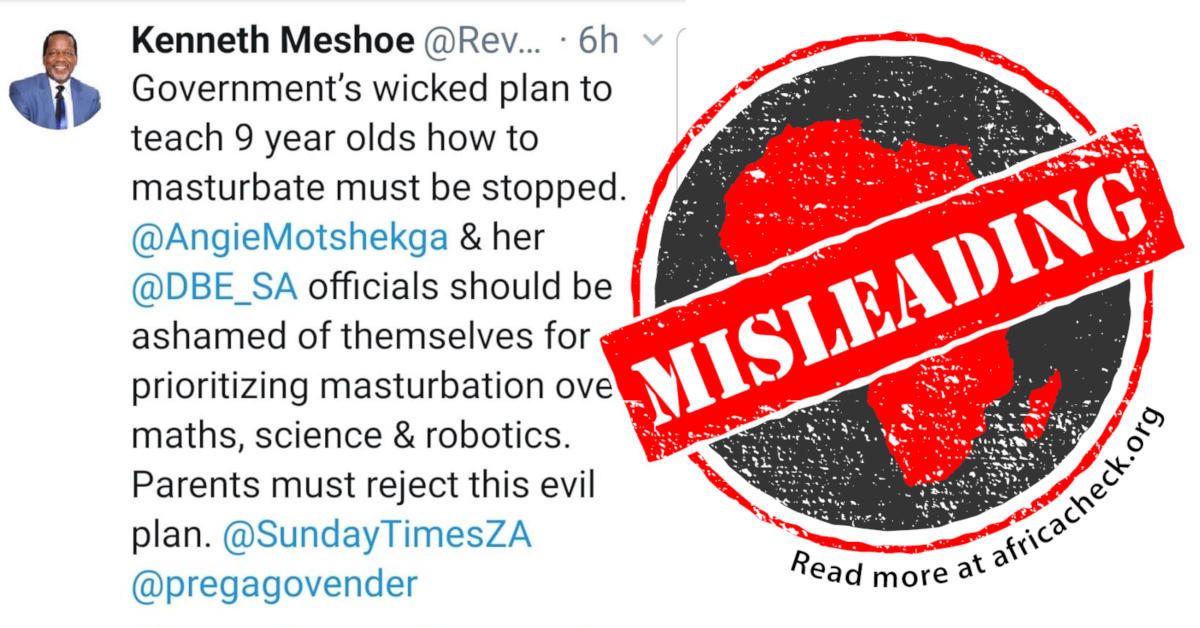The leader of a South African political party recently warned parents to reject an “evil plan”.
The African Christian Democratic Party shared a screenshot of a tweet by party leader Kenneth Meshoe on its Facebook page.
“Government’s wicked plan to teach 9 year olds how to masturbate must be stopped,” Meshoe tweeted on 13 May 2019. “[They] should be ashamed of themselves for prioritising masturbation over maths, science and robotics.”
Meshoe’s tweet followed a Sunday Times news report that claimed “children as young as nine will learn about masturbation when new life orientation textbooks are rolled out next year”.
The report quoted well-known South African sex therapist Dr Marlene Wasserman (known as Dr Eve), one of the experts who contributed to the new textbooks.
She is reported to have said that “masturbation is normal and is threaded through [the curriculum] from grade 4”.
“[Dr Eve] said grade 4 pupils would learn about consent in friendships, and older pupils would learn about sexual consent.”

But South Africa’s department of basic education called the news report “misleading” and a “complete misrepresentation of the work the department is doing”.
“The new life orientation textbook for grade 4... does not cover masturbation,” the department said. “The grade 4s will learn, in a most age appropriate and sensitive way, how babies are made.”
The department said the new textbooks were based on sexuality education guidelines by the United Nations Educational, Scientific and Cultural Organization.
The guidelines say children aged 9 to 12 years (grade 4 students are typically 9 years old) should be able to acknowledge that “masturbation does not cause physical or emotional harm but should be done in private”.
The guidelines do not include references to children being taught how to masturbate. - Africa Check (28/05/19)
The African Christian Democratic Party shared a screenshot of a tweet by party leader Kenneth Meshoe on its Facebook page.
“Government’s wicked plan to teach 9 year olds how to masturbate must be stopped,” Meshoe tweeted on 13 May 2019. “[They] should be ashamed of themselves for prioritising masturbation over maths, science and robotics.”
New life orientation textbooks
Meshoe’s tweet followed a Sunday Times news report that claimed “children as young as nine will learn about masturbation when new life orientation textbooks are rolled out next year”.
The report quoted well-known South African sex therapist Dr Marlene Wasserman (known as Dr Eve), one of the experts who contributed to the new textbooks.
She is reported to have said that “masturbation is normal and is threaded through [the curriculum] from grade 4”.
“[Dr Eve] said grade 4 pupils would learn about consent in friendships, and older pupils would learn about sexual consent.”

‘Misleading and complete misrepresentation’
But South Africa’s department of basic education called the news report “misleading” and a “complete misrepresentation of the work the department is doing”.
“The new life orientation textbook for grade 4... does not cover masturbation,” the department said. “The grade 4s will learn, in a most age appropriate and sensitive way, how babies are made.”
The department said the new textbooks were based on sexuality education guidelines by the United Nations Educational, Scientific and Cultural Organization.
The guidelines say children aged 9 to 12 years (grade 4 students are typically 9 years old) should be able to acknowledge that “masturbation does not cause physical or emotional harm but should be done in private”.
The guidelines do not include references to children being taught how to masturbate. - Africa Check (28/05/19)
Republish our content for free
For publishers: what to do if your post is rated false
A fact-checker has rated your Facebook or Instagram post as “false”, “altered”, “partly false” or “missing context”. This could have serious consequences. What do you do?
Click on our guide for the steps you should follow.
Publishers guideAfrica Check teams up with Facebook
Africa Check is a partner in Meta's third-party fact-checking programme to help stop the spread of false information on social media.
The content we rate as “false” will be downgraded on Facebook and Instagram. This means fewer people will see it.
You can also help identify false information on Facebook. This guide explains how.




Add new comment